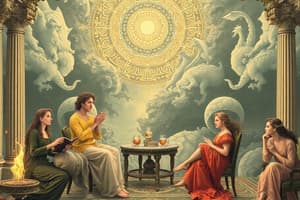Podcast
Questions and Answers
What is the primary purpose of tragedy, according to Aristotle?
What is the primary purpose of tragedy, according to Aristotle?
- To evoke pity and fear in the audience, leading to catharsis. (correct)
- To provide a clear moral lesson about good and evil.
- To entertain the audience with dramatic stories.
- To showcase the lives of virtuous and just individuals.
According to Aristotle, what should tragedies ultimately leave their audience with?
According to Aristotle, what should tragedies ultimately leave their audience with?
- A desire for revenge against those who caused the tragedy.
- A sense of absolute certainty about human values.
- A feeling of profound sadness and despair.
- A deeper comprehension of human limitations and the complexities of existence. (correct)
What is the correct order of events that occur in Aristotelian tragedy?
What is the correct order of events that occur in Aristotelian tragedy?
- Chaos, restoration of order, order.
- Chaos, order, restoration of order.
- Order, chaos, restoration of order. (correct)
- Restoration of order, chaos, order.
What are the three unities as defined by Aristotle and which a tragedy should be based on?
What are the three unities as defined by Aristotle and which a tragedy should be based on?
How are Shakespeare's plays different to Greek tragedies according to the text?
How are Shakespeare's plays different to Greek tragedies according to the text?
According to Aristotle, what is a key characteristic of the ideal tragic hero?
According to Aristotle, what is a key characteristic of the ideal tragic hero?
What does 'hamartia' refer to in the context of Aristotelian tragedy?
What does 'hamartia' refer to in the context of Aristotelian tragedy?
According to Aristotle, why should the tragic hero occupy a position of high status?
According to Aristotle, why should the tragic hero occupy a position of high status?
Flashcards
What is the purpose of tragedy?
What is the purpose of tragedy?
A tragic play aims to evoke emotions of pity and fear in the audience, leading to a purging of these feelings at the play's conclusion.
What is hamartia?
What is hamartia?
A flaw in judgment or a character defect that leads to the tragic hero's downfall.
Describe the ideal tragic hero.
Describe the ideal tragic hero.
The ideal tragic hero has high status, is flawed, and suffers due to a mistake or weakness.
What is the unity of place?
What is the unity of place?
Signup and view all the flashcards
What is the unity of time?
What is the unity of time?
Signup and view all the flashcards
What is Aristotle's preferred pattern in tragedy?
What is Aristotle's preferred pattern in tragedy?
Signup and view all the flashcards
What is the unity of action?
What is the unity of action?
Signup and view all the flashcards
Why is high status important for a tragic hero?
Why is high status important for a tragic hero?
Signup and view all the flashcards
Study Notes
Aristotle's Literary Theory - Tragedy
- Catharsis: Tragedy aims to evoke pity and fear in the audience, allowing them to purge these emotions through the play's resolution.
- Human Condition: Tragedies explore the complexities and fragility of human life, questioning suffering's reasons and the role of choice versus fate.
- Order to Chaos: Aristotle's ideal tragedy follows a pattern: initial order, disruption, and restoration of order, embodying societal values (rationality, morality, strong leadership).
- Three Unities: Tragedies should adhere to these:
- Time: Action confined to a single day (or play length).
- Place: Action occurs in a single location.
- Action: One central plot/series of events.
- Tragic Hero: Ideal protagonist is renowned, prosperous, but flawed (not evil), whose misfortune results from a mistake or weakness.
- Hamartia: The tragic flaw or error in judgment causing the hero's downfall. It's a significant mistake, not simply a moral weakness.
- High Status: The hero should be of high social standing, impacting others and society.
- Shakespeare's Departure: Shakespeare's tragedies often do not observe the three unities, exploring a wider range of social and political issues, including specific Jacobean society concerns.
Studying That Suits You
Use AI to generate personalized quizzes and flashcards to suit your learning preferences.




